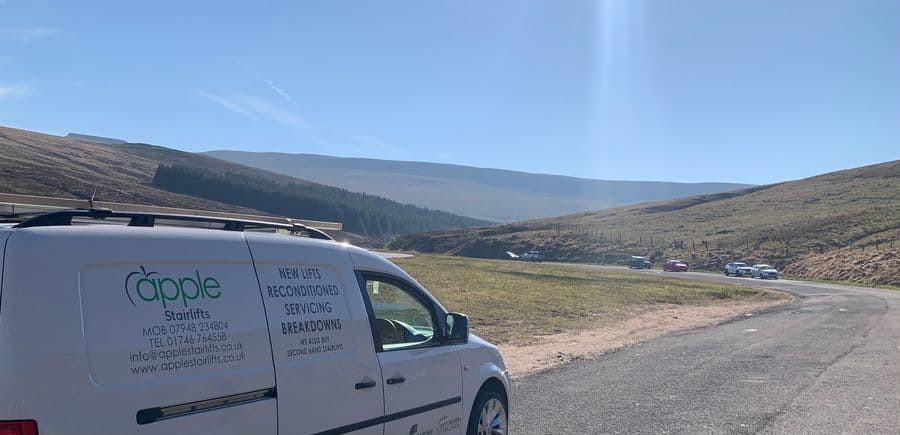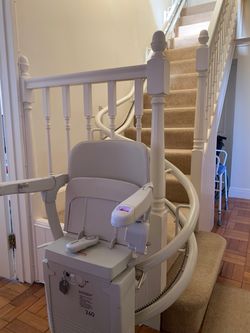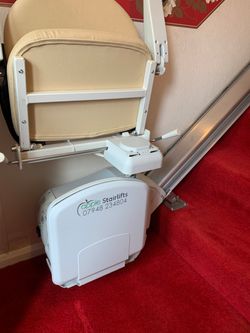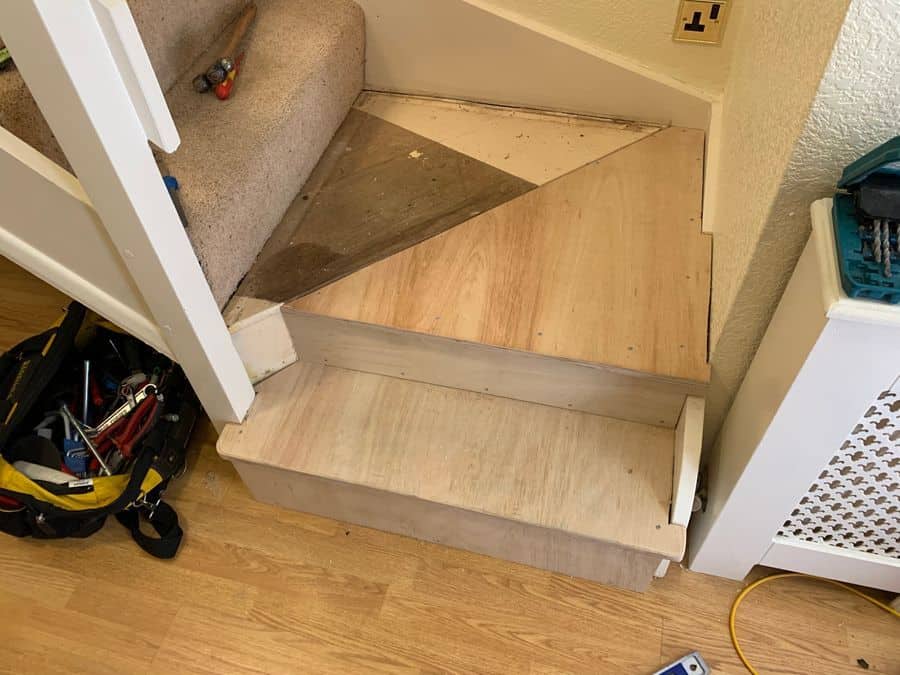Retailer Spotlight: How Apple Stairlifts is rising up to the challenge

Starting a new business at the tail end of a nationwide pandemic could be a tough prospect for most, but with plenty of experience behind him and a strong work ethic, Julian Turnock of Apple Stairlifts is determined to succeed…
“I’m really excited to get back to the career I love,” says Julian Turnock, Director of new start-up Apple Stairlifts.
“Not just installing stairlifts, but changing people’s lives and assisting them to overcome daily challenges.”
After working In the lift industry for over 26 years, it had always been an ambition of Julian’s to set up and run his own company, but the turning point came last October when his employer underwent a company re-shuffle.
Says Julian: “After working for Handicare for 18 years and reaching the position of National Service Manager, the decision was taken to have a reshuffle of the senior managers in the field service department and I decided to leave the business then.
“I had to make a decision. Do I work for someone else or fulfil my ambition and start up my own stairlift company?”
For a few months, Julian, a multi-skilled engineer, worked at his dad’s business, helping to install disability lifts onto coaches, but by April he was ready to get the ball rolling on his own business.

Location, location, location
Julian’s business would be focused around selling both new and reconditioned lifts while offering a breakdown and planned maintenance service. His first task was to start purchasing a number of used and second-hand lifts, and begin reconditioning them in readiness to fulfil potential orders.
He will usually carry stock of around 50 stairlifts at any one time, which are from a number of manufacturers. The plan is to ultimately purchase a 1,500 to 2,000 square foot premises for his business, which will have a small stairlift showroom at the front and a workshop at the rear of the unit.
Trying to find appropriate premises for his business at the right size and price in the Bridgnorth area, however, has been a challenge.
“Anything under 2,000 square foot is snapped up quickly,” says Julian. “There’s nothing out there unless you go over 3,500 square foot.”
Further down the line, if he finds that he needs to turn his premises into a full mobility shop, he will look at using powered container storage local to where he lives, so that he still has the flexibility to control his overheads as stock increases and decreases.
Initial challenges
For Julian, one of the surprising challenges in starting up his business to begin with was finding national manufacturers willing to set up an account with him.
“There seems to be a real concern on their part about upsetting other dealers that already supply in the area you are operating in,” he says.
“I can understand this to a degree but in the future when the percentage of units I will require each month has increased they will review the decision and then potentially want to sell to me.
“For example you can buy branded coffee and tea in all supermarkets, and also in the corner shop, so I don’t see the difference.”
The only people to really suffer from a manufacturer’s unwillingness to expand its retailer network is the end-user, says Julian.
“If manufacturers are only selling to select retailers for the fear of upsetting another retailer, it ultimately restricts the choice of the end user in finding the right solution to their mobility needs.”

Reaching customers
Julian’s many years of field service management experience has stood him in good stead with his business, so any challenges that have come his way have been mostly administerial he says.
He hired someone to design his brand and another to help on the social media side of things, and designing his website.
As time has gone on, he has developed his skills around accountancy packages and marketing. “You really need to really chase people to get these things done,” laughs Julian.
Everything else, he says, is starting to take shape, and he plans to launch a number of adverts in local magazines in Bridgnorth to publicise his business and continue spreading the word via social media.
“The aim of our business is to really bring a stairlift solution to every person that is in need of our services at a price they can afford,” he adds.
There have been no problems with local competition, says Julian, as Apple Stairlifts offers sub contract installation and engineering services to other companies within the industry.
“I would rather work with people and companies than have challenges with them,” adds Julian, who says that he is prefers to stay focused on what he’s doing and doing it well, while giving outstanding customer service.
“I genuinely want to support the communities around me that support my business. Yes, I need to earn a living but I will not compromise on our values. I believe that the best marketing of all is “word of mouth.””
The key to surviving as a new business is having the flexibility to adapt and to “paddle your own canoe,” says Julian.
“I’ve seen companies for many years wrap themselves up in what the competition are doing, but who’s to say that the competition is going down the right route? Do what you do, and do it well, and give first class customer service – that is my aim.”
Looking beyond the stairlift sector
The main challenge facing Apple Stairlifts over the next 12 months will be finding skilled people, says Julian.
“We are starting to look at government training schemes now so we can get people on board and train them to the standard our client deserves and should expect.”
Very few companies are prepared to invest in training apprenticeships, says Julian, and good stairlift engineers are hard to come by so he has found that taking somebody from outside of the industry, but with the right skillset, is key.
Julian is currently taking on an engineer with a mechanical background.
“He is an HGV (heavy goods vehicle) mechanic, so he’s got the necessary skills regarding engineering and mechanical awareness. His knowledge of the 24 volt electrical systems that you get on lorries is very adaptable for the stairlift industry.”
Julian has been training him on stairlifts and once the engineer has finished his manufacturer’s training, he’ll shadow Julian out on the field for two months until he is at the required standard.
One of the advantages of his business, Julian explains, is being able to pick and choose from a broad range of lifts from different brands rather working with the small portfolio of a large manufacturer.
The one lift, he says, that has surprised him is the Bespoke Stairlifts Synergy lift. “It’s not very well known but it’s a clean-looking lift that is both easy to use and comfortable for the client. I really think they’ve taken the time with the end-user getting involved when they developed the product.”
Another advantage with this lift, Julian adds, is that he doesn’t need to buy additional parts for it if he needs to take the second-hand lift out and put it back in somewhere as a right-hand lift as everything is interchangeable.
Facing the future
Julian has some exciting ideas for the future. “People who know me know I like to think outside the box. I’m really looking forward to supporting more of the rural communities and I am already in talks with some charities about working with them to offer stairlift rentals for the terminally ill.”
In just a few months Julian has gone from a steady income and enduring the pandemic to becoming self-employed and starting from scratch, but Julian is happy with the direction his career is taking.
“I think the biggest positive is being back in the field customer-facing. People do give me a strange look when I say it, but when I’m asked what I do for a living, I always say: ‘I change people’s lives.’ I believe that’s what all of us in the mobility and disability industry do.
“It doesn’t matter whether you sell mobility scooters, stairlifts or walking aids, you are not just going to work tomorrow, you are going to change somebody’s life for the better.
You can’t put a price on that and we should all be proud of what we do.
“In my former job, I worked with some of the most brilliant and dedicated people I have ever met and I do miss them but I’m sure in the future I will work with some of them again.”
Looking forward, though, Julian says that there is scope for the company to expand beyond the stairlift sector.
“To be honest, we have been super busy. We have hit the ground running and we see real potential to grow the business.
“What is key for us over the next 12 months is to grow the business but also put the correct structure in place that we have a solid foundation to be able to sustain that growth and also the ability to expand into other areas of the mobility sector and not only stairlifts.”
www.applestairlifts.co.uk



